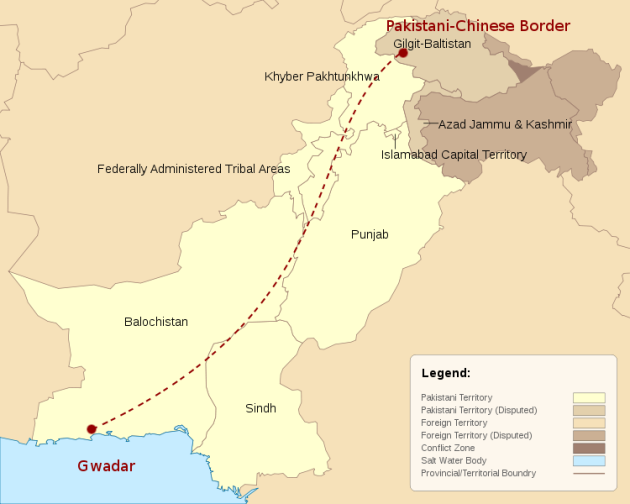Pakistan and China recently signed agreements to build a new airport and upgrade the Karakorum Highway in Balochistan, demonstrating further commitment to a China-Pakistan Economic Corridor (CPEC).
Recently signed agreements between the Pakistan and Chinese governments will benefit an already well-established relationship that saw bilateral trade over $12 billion in 2012. These agreements come in conjunction with China’s significant investment in Gwadar port.
An Economic Success?
For Pakistan, this investment could offer an economic boost to insurgency-hit Baluchistan. It could help create the infrastructure needed to capitalize on the resource rich province and give much-needed support to Pakistan’s $225 billion economy. For China, the projects offer improved regional connectivity through road, rail and sea. Gwadar port will provide the shortest possible route for importing oil from the Gulf.
China will invest $20 billion, yet analysts argue CPEC is far from economically viable. Maritime shipping routes remain cheaper with greater transport capacity and overland routes are still relatively uncompetitive.
It is about more than trade
China’s primary motive is not economic; trade with Pakistan comprises only a fraction of its global commerce. Moreover, China has shown sustained commitment to Balochistan’s redevelopment, providing 75 percent of an initial $250 million to build the port in 2007. Furthermore, in 2010, despite Pakistan awarding operating licenses to Singapore Ports Authority (SPA), China persisted by offering to construct 20 more berths and fully operationalize the port.
Domestic energy security is a driving force. According to the Ministry of Land and Resources, China’s crude oil and natural gas output in 2030 will be more than double the figure for 2013. Also, around 50 percent of China’s oil comes from the Middle East; a port close to the Persian Gulf would allow Middle Eastern imports to be transported overland, providing an alternative route to the Strait of Malacca through which over 80 percent of imported oil passes. However, the port has arguably led to closer India-US military ties too, countering China’s increasing regional presence and ‘String of Pearls’ strategy.
Growing conflict impedes the economic benefit
Despite the long-standing partnership, increased Chinese presence could aggravate local political grievances. Within Baluchistan, there is an acknowledged terrorist threat, with local insurgents having actively sought an independent state since the 1970s.
Others are increasingly frustrated by the favourable operating terms awarded to foreign enterprises; the SPA was exempt from corporate tax and certain import duties. Several attacks against Chinese engineers recently occurred, and in 2011 security concerns led a Chinese mining firm to cancel a $19 billion deal.
Similarly, the destination province Xinjiang suffers from increasingly aggressive terrorist attacks. Eleven people recently died in an “attack” in the region, thought to be associated with the UN and US-labeled terror group East Turkestan Islamic Movement (ETIM). Authorities believe militants have aided such attacks within neighboring countries.
China is taking steps to reduce political unrest
Indeed, the severity of the terrorist threat and its implications for an economically viable trade corridor should not be taken lightly. China seems to agree, when in the last week of February, during a rare visit by a top official, China requested neighbouring Afghanistan to ‘embrace an inclusive political solution to its long-running conflict.’ Security in the western regions security of Western regions of China depended on it.
A profitable trade corridor is far off. However, China’s interest is not economic but rather political. Regardless, local grievances remain a concern to both Pakistan and China – especially as they are open to exploitation by regional actors affected by China’s strategic investments. Recent attacks in both Balochistan and Xinjiang suggest little economic gain in the short-term, and long-term pay-off will depend on the security of the wider region.











